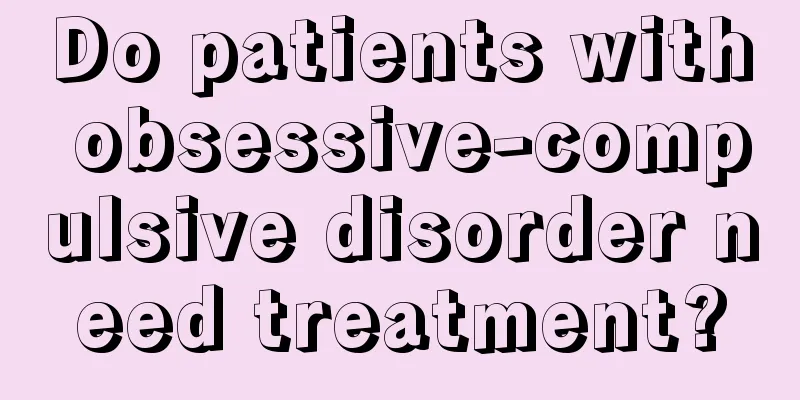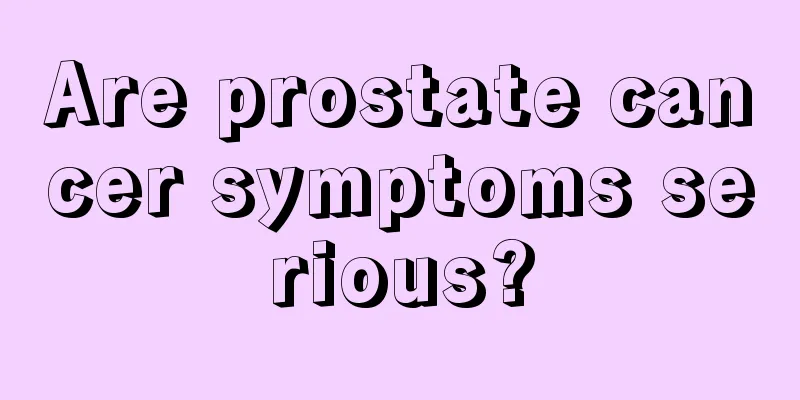Do patients with obsessive-compulsive disorder need treatment?

|
There is no specific introduction as to the specific cause of obsessive-compulsive disorder in patients, but what we know more or less is that it is related to life habits and personal psychological problems. At this time, someone asked, since the cause of obsessive-compulsive disorder has not been found, should this obsessive-compulsive disorder be treated? It is more of a psychological disease. Take a look at the following area: It needs treatment. Currently there are two methods: psychotherapy and drug therapy. Both play a vital role in alleviating the patient's condition. 1. Psychotherapy As a psychological disease, the pathogenesis of obsessive-compulsive disorder is very complex, and patients with similar symptoms may have very different psychological mechanisms. In psychotherapy, therapists establish a good doctor-patient relationship with patients, listen to patients, help them discover and analyze their inner conflicts, encourage them to solve problems, increase their ability to adapt to the environment, and reshape their healthy personality. Commonly used clinical methods include: psychodynamic therapy, cognitive behavioral therapy, supportive psychotherapy and Morita therapy. Among them, cognitive behavioral therapy is considered to be the most effective psychological treatment for obsessive-compulsive disorder, which mainly includes thought blocking and exposure reaction prevention. The thought blocking method is to divert attention or exert external control when patients have recurring obsessive thoughts, such as setting an alarm clock, to block obsessive thoughts, and cooperate with relaxation training to relieve anxiety when necessary. Exposure response prevention is to encourage patients, under the guidance of a therapist, to gradually face situations that may cause obsessive thinking without generating compulsive behaviors. For example, if a patient is very afraid of dirt and must wash his hands repeatedly to ensure that he does not get sick, he will need to gradually come into contact with his own sweat, soles of his shoes, door handles of public restrooms, and toilet seats without washing his hands during several treatments. Because what the patient worries about will not actually happen, the anxiety associated with the obsessive symptoms will be alleviated until it subsides after multiple treatments, thereby achieving the effect of controlling the obsessive symptoms. 2. Medication The onset of obsessive-compulsive disorder is related to the imbalance of multiple neurotransmitters in the brain, which is mainly manifested as dysfunction of the serotonin system. The anti-obsessive drugs currently used are all antidepressants, whose characteristic is that they can regulate the functions of neurotransmitters such as serotonin in the brain, thereby achieving the effect of improving obsessive-compulsive symptoms. The most commonly used drugs are selective serotonin reuptake inhibitors (SSTIs), including fluvoxamine, paroxetine, sertraline, fluoxetine, citalopram, etc., and the tricyclic antidepressant clomipramine. When necessary, propranolol and benzodiazepines are also used clinically to help relieve patients' anxiety and improve insomnia. For refractory obsessive-compulsive disorder, risperidone, quetiapine, olanzapine, aripiprazole, etc. are often used in combination as synergists to improve efficacy. Like psychotherapy, the effects of drug therapy are not immediate. General SSRIs take 10 to 12 weeks to achieve a full anti-compulsive effect, and if the treatment is effective, it still needs to be maintained for 1 to 2 years to consolidate the effect. 3. Physical therapy For patients with refractory obsessive-compulsive disorder, modified electric shock therapy and transcranial magnetic stimulation can be used selectively according to the specific situation. Neurosurgery is considered the last option for treating obsessive-compulsive disorder. Because of its adverse reactions such as convulsive attacks and sensory loss, the surgical indications must be strictly controlled, and patients should consider whether to undergo surgery after consultation with three chief psychiatrists. Obsessive-compulsive disorder itself is a mental illness, so if it is not treated for a long time, it will still have an impact. It’s just that if the patient can control the condition well and it doesn’t harm his or her own body or friends and family around him or her, you don’t need to pay too much attention to it. But if you need treatment, you must follow the doctor’s instructions to ensure that there will be no problems. |
<<: How to make your own tea for lowering high blood lipids
>>: What is pulmonary calcification
Recommend
Bacterial infection but low white blood cell count
If a bacterial infection occurs and the white blo...
Can honey remove blackheads?
Many girls have a lot of blackheads on their nose...
What are the possible symptoms of early liver cancer? Summary of atypical symptoms of early liver cancer
When people think of liver cancer, they think of ...
What are the symptoms of bladder cancer before death?
Bladder cancer is a malignant tumor that originat...
What is a simple way to sober up? ·
Getting drunk after drinking is a very common pro...
Nursing Care for Patients with Hamartoma
People are actually timid, especially when it com...
How to diagnose kidney cancer
Kidney cancer is a malignant tumor that mainly oc...
Brief analysis of the main early symptoms of colorectal cancer
Early treatment is beneficial for any disease, es...
What causes black urine?
When the urine is black, many people are afraid, ...
What is the TCM treatment for cardiomyopathy
Cardiomyopathy is one of the common heart disease...
How to prevent liver cancer in life? Three key points to prevent liver cancer
To effectively prevent liver cancer, we must star...
How do rectal polyps form?
Rectal polyps are a type of benign tumor of the r...
What factors are related to the occurrence of bile duct cancer
Cholangiocarcinoma is a malignant tumor and a rel...
Find out the main causes of skin cancer for you
Many people should know about the occurrence of s...
What happens if you put hot food in the refrigerator?
I believe everyone is familiar with the refrigera...









